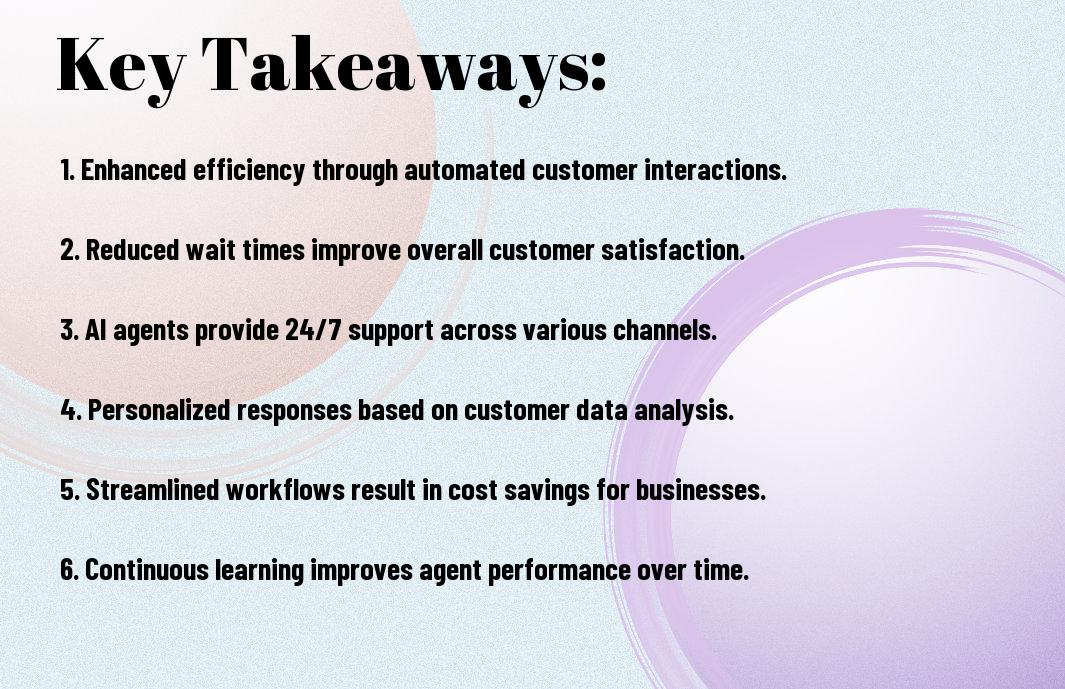It’s clear that AI voice agents are transforming the landscape of call centers by enhancing efficiency and customer experience. As you explore this shift, you’ll discover how these sophisticated systems can streamline operations, reduce wait times, and improve service quality. By leveraging AI, you can not only meet evolving customer expectations but also stay ahead in a competitive market. To learn more about this exciting change, check out How AI is Changing Call Centers & How to Benefit.
Key Takeaways:
- Enhanced Efficiency: AI voice agents streamline call center operations, significantly reducing wait times and improving response rates.
- Cost Savings: Implementation of AI voice technology leads to decreased operational costs by minimizing the need for large human staff.
- 24/7 Availability: AI voice agents provide constant availability, ensuring customer support is accessible at all hours.
- Personalized Interactions: Advanced AI capabilities allow for tailored customer interactions based on previous interactions and preferences.
- Data-Driven Insights: AI voice agents can analyze interactions to provide valuable insights, enhancing overall service and improving strategies.
The Rise of AI Voice Agents
While traditional call centers have relied on human agents to field queries, the rise of AI voice agents is transforming this landscape. These digital assistants are not only improving efficiency but also enhancing customer experience by providing instant responses and support around the clock. As businesses seek to streamline operations and reduce costs, the adoption of AI voice agents is becoming a strategic necessity.
Historical Context
Among the earliest forms of automated customer service were basic telephone answering systems, which gradually evolved into more sophisticated Interactive Voice Response (IVR) systems. Over the years, advancements in natural language processing and machine learning have paved the way for AI voice agents to take front and center in customer interactions, offering a glimpse into a future where human interaction is complemented by intelligent automation.
Technological Advancements
One of the key factors driving the expansion of AI voice agents is the rapid advancement in technologies such as machine learning, natural language processing, and speech recognition. These innovations enable voice agents to understand context, respond intelligently, and learn from interactions, making them more capable than ever.
At the core of these advancements is the ability of AI voice agents to analyze vast amounts of data and continuously improve their interactions. With high-quality training datasets and powerful algorithms, these agents can learn from past conversations, adapt to different customer needs, and deliver personalized experiences. As voice recognition technology becomes more nuanced, you’ll find that AI voice agents can effectively handle complex inquiries, ultimately leading to increased customer satisfaction and operational efficiency in call centers.

Benefits of AI Voice Agents in Call Centers
There’s a growing recognition of the transformative benefits AI voice agents bring to call centers. With their ability to handle high volumes of calls, these agents improve operational efficiency while delivering faster response times. By automating routine inquiries, you can reallocate human resources to more complex issues, ensuring better use of your team’s skills and energy.
Improved Efficiency and Response Times
Along with optimizing workflow, AI voice agents significantly reduce customer wait times. By instantly addressing inquiries and routing calls to the appropriate departments, you enhance your overall call center performance. This streamlining ultimately leads to quicker resolutions, alleviating bottlenecks and ensuring your customers feel valued and heard.
Enhanced Customer Experience
Response times greatly impact how customers perceive your brand. AI voice agents provide instant access to information and support, ensuring that you address customer needs promptly and accurately. This availability not only increases customer satisfaction but also builds trust in your service.
Consequently, as more customers interact with your AI-driven systems, they experience seamless service, leading to higher retention rates. Personalized recommendations and 24/7 availability allow your clients to engage on their terms, enhancing their overall journey with your brand. This focus on improving customer interactions can significantly boost loyalty and positive word-of-mouth, making it a win-win for your call center operations.

Challenges and Limitations
To fully realize the potential of AI voice agents in call centers, you must consider the challenges and limitations they pose. Issues such as technical integration, data privacy, and the ability to handle complex queries continue to affect their effectiveness. Additionally, the lack of human empathy and understanding can hinder customer interactions, making it necessary for organizations to address these shortcomings to enhance performance and customer satisfaction.
Implementation Barriers
Challenges arise when you implement AI voice agents due to the necessary infrastructure changes and training required. Integrating these systems into existing frameworks can be time-consuming and costly. Moreover, staff may need extensive training to work alongside AI technology effectively, which can delay the deployment process and affect overall adaptability.
Customer Acceptance and Trust Issues
To ensure the success of AI voice agents, it’s vital to address customer acceptance and trust issues. Customers might feel hesitant to interact with machines instead of human representatives, leading to a lack of engagement and satisfaction. Your organization needs to focus on building trust, as positive experiences can foster acceptance and seamless interactions.
Understanding customer attitudes towards AI is fundamental to your successful implementation. Many customers may worry about data security and feel anxious about the loss of human touch in service. Providing clear communication about how these systems operate and emphasizing their efficiency can help mitigate concerns. Regularly gathering customer feedback can also help adjust your approach to meet their expectations, ultimately improving their experience with AI voice agents.
Use Cases of AI Voice Agents
Despite the advancements in technology, traditional call centers still face challenges in efficiency and customer satisfaction. AI voice agents have emerged as a game-changer, providing consistent and immediate support. By automating routine queries and offering personalized interactions, you can enhance customer experience and optimize resources in your call center operations.
Successful Case Studies
Between various industry sectors, several companies have successfully implemented AI voice agents, yielding impressive results:
- A major telecom provider saw a 30% reduction in call handling time.
- A leading bank reported a 25% increase in customer satisfaction scores after deploying AI assistants.
- A healthcare provider managed to respond to 50% more patient inquiries without increasing staff.
- A retail giant noted a 40% decrease in call volume after implementing AI-driven FAQs.
Industry Applications
For numerous industries, AI voice agents serve diverse purposes, from customer support to order processing. They have become invaluable in sectors such as finance, healthcare, and retail, streamlining operations and enhancing user engagement. By analyzing data and learning from interactions, AI voice agents ensure your organization can meet customer demands efficiently.
Hence, the integration of AI voice agents into your call center system not only boosts operational efficiency but also better aligns with customer expectations. By adopting this technology, your business can remain competitive, providing timely and effective solutions, while ensuring a seamless experience for every customer interaction.
Future Trends in AI Voice Technology
All indicators suggest that AI voice technology will continue to evolve, enhancing customer interactions and driving efficiency in call centers. As these systems integrate more advanced natural language processing and machine learning capabilities, you can expect even more personalized and seamless communication experiences. For insights into how Text-to-Speech AI Revolutionized Call Centers, explore the latest advancements shaping this future.
Innovations on the Horizon
Any future advancements in AI voice technology promise to further automate and refine customer interactions. Features like emotion recognition, context-aware dialogue, and refined voice synthesis will empower you to enhance customer satisfaction while decreasing operational costs.
Predictions for Call Center Operations
Predictions indicate that AI voice agents will soon handle a larger portion of customer inquiries, allowing human agents to focus on more complex issues. This shift will streamline operations, improve response times, and heighten overall customer satisfaction.
But this transition won’t happen overnight. You may see initial challenges as your organization adapts to new technologies and trains staff to work alongside AI. As you navigate this evolution, stay informed about innovations and continuously assess their impact on your operations to optimize performance and maintain a competitive edge.
Best Practices for Integration
For a seamless integration of AI voice agents into your call center, it’s important to assess your existing systems and processes. Start by defining clear goals and identifying specific areas where AI can add value. Collaborate closely with your IT and operations teams to ensure compatibility and streamline workflows. Also, prioritize user experience by providing adequate support and resources for agents to adapt alongside the technology. This holistic approach will set the foundation for successful implementation and ultimately enhance your service delivery.
Training and Development
Development of your team is vital for maximizing the benefits of AI voice agents. Invest in comprehensive training programs that familiarize your staff with the technology, as well as its features and limitations. Empower them with the skills needed to manage interactions and escalate issues appropriately. Providing ongoing training will not only improve performance but also encourage your team to embrace the change, thereby fostering a positive mindset towards the integration.
Continuous Improvement Strategies
Best practices for continuous improvement include regular assessments of your AI systems and employing feedback loops. This proactive approach allows you to make necessary adjustments based on agent input and customer experiences.
Hence, embracing continuous improvement strategies ensures that your AI voice agents remain effective and aligned with your evolving business needs. It is important to gather feedback from both customers and agents regularly. Utilize analytics to identify trends, address common pain points, and enhance AI performance. Implementing iterative updates and refinements will help maintain optimal service levels and improve customer satisfaction over time, solidifying the role of AI in your call center operations.
Summing up
Considering all points, AI voice agents are significantly transforming the landscape of call centers, enhancing efficiency and customer satisfaction. By automating routine queries and providing instant assistance, these agents allow you to focus on more complex tasks while ensuring your customers receive timely responses. As you embrace this technology, you’ll likely see improved productivity, reduced operational costs, and a better overall experience for your clients. Adopting AI voice agents positions your business as a forward-thinking entity, ready to meet the demands of a rapidly evolving marketplace.
FAQ
Q: What are AI voice agents and how do they function in call centers?
A: AI voice agents are advanced software programs designed to simulate human conversation through voice interaction. In call centers, these agents utilize natural language processing (NLP) and machine learning to understand and respond to customer inquiries. They can manage a variety of tasks, such as answering frequently asked questions, processing orders, and providing customer support, all while maintaining a conversational tone. By automating these processes, AI voice agents significantly enhance operational efficiency and reduce wait times for customers.
Q: How do AI voice agents improve customer experience in call centers?
A: AI voice agents play a significant role in improving customer experience by providing faster and more accurate responses to inquiries. They are available 24/7, allowing customers to get assistance at any time without needing to wait for a human agent. Additionally, these agents can handle multiple calls simultaneously, reducing call volume stress on human representatives. The use of personalized interactions, powered by data analysis and AI, allows these agents to offer tailored solutions, which enhances customer satisfaction and loyalty.
Q: What challenges do businesses face when implementing AI voice agents in call centers?
A: While AI voice agents offer numerous benefits, businesses may encounter challenges such as technological integration, training requirements, and data privacy concerns. Implementing advanced AI systems requires alignment with existing infrastructure and may need significant adjustments to workflow processes. Moreover, training AI voice agents involves feeding them large volumes of data to ensure they understand various scenarios effectively. Additionally, maintaining data security and complying with regulatory standards is paramount, as handling sensitive customer information poses inherent risks.

